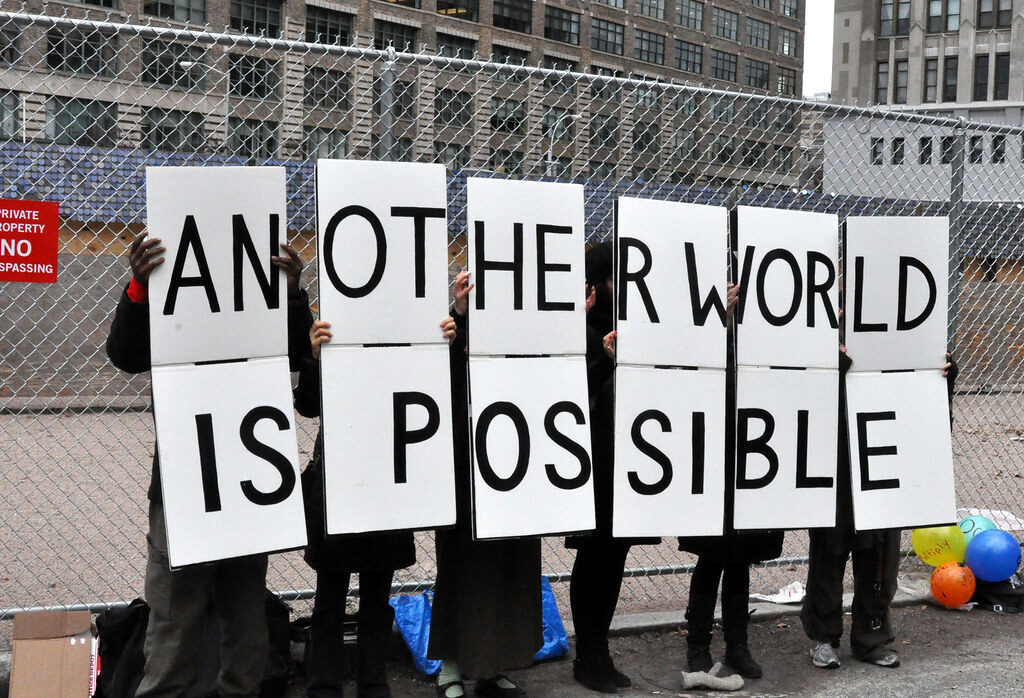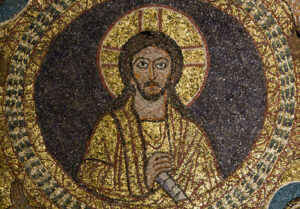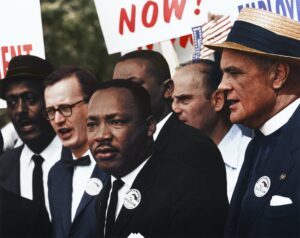An interview with Jeremy Posadas | May 10, 2021
For the second forum in the “Engaging Christianities and Socialisms,” hosted by the Institute for Christian Socialism and the Wendland-Cook Program in Religion and Justice, Jeremy Posadas sat down with Aaron Stauffer to explore the significance of Christian socialism today, how theology bolsters his socialism, and how churches can confront the challenges of capitalism. You can watch the webinar that accompanied this forum here, entitled “How Can Christian Socialists Build Deep Solidarity?”
Aaron: Well, Jeremy, again, thanks for taking this time to sit down and talk with me. We’re really excited to have you be a part of the upcoming Engaging Christianities and Socialisms webinar titled, How can Christian Socialists Build Deeper Solidarity?
To start, I want to get a sense of what it means for you to call yourself a Christian socialist. What does that term mean to you?
Jeremy: I think, for me, it says as much about what it means to apply the label socialist to Christian as it puts me in relation to other socialists. To say I’m a Christian socialist is to say I find value in Christian traditions for thinking about why socialism makes sense as an approach and that Christianity provides the kind of foundational ideas about human being and about society that motivate or bring me to a socialist vision. But in some ways I find it’s as important to think about what it means to say I’m a socialist Christian as a Christian socialist.
Particularly now there’s a lot of discussion in left Christianity or progressive Christianity in light of the Trump era—and the utterly reprehensible collusion between Christianity and Trumpism that assists white nationalism—but, for me, to connect socialism and Christianity is to say it’s not enough for progressive Christians to have a bland kind of general inclusiveness that doesn’t really look at undermining, disrupting, or dismantling fundamental economic systems. There are some versions of progressive Christianity that are largely comfortable with the underlying capitalist system that we’re in and mostly want to make it a little less bad without really reworking some of those fundamental mechanisms that create these problems.
The connection between Christianity and socialism is also a commitment to fundamentally transform not only identity-based inequalities and disparity, but also class-based forms of inequality and exploitation. For a number of years I’ve shared in the concern of Christian scholars and activists—including the Wendland-Cook Program—that we just aren’t paying enough attention to class-based inequalities and integrating that with identity-based inequalities. I find that the Christian socialist vision does a good job bringing those concerns together.
Aaron: I think that was one of the things that I really loved about our first conversation with Cornel West, Joerg Rieger, Cynthia Moe-Lobeda, and Angela Cowser. That conversation helped emphasize that a socialism without a Christianity is, say, soulless—that a general humanism for Christian socialism isn’t enough.
Perhaps let’s get a little more theological here, though. What theological concepts, then, do you really find as particularly operative in your socialism?
Jeremy: One concept that’s been important to me for several years now is a Christian theology of creation. Such a concept of creation, to my mind, does not replace Marxist perspectives on material interest but complements it. I’m thinking here of Christian cosmology, protology (the area of doctrine dealing with first things and beginnings), as well as anthropology. In a different way, each of these concepts gets at the question, “What is the vision of society we’re going for and why?” What’s crucial here is focusing both on the what and the why of this question, because the Christian doctrine of creation says there’s a fundamental connectedness and integrality that is our ground of being and the source of our life-force, as well as the vision where we seek to be. Again that doesn’t replace a sort of classical Marxist analysis of material interests and conflict, but it provides another way to talk about our relationality to one another.
Another important theological concept involves the ongoing struggle in Christian theology regarding eschatology. For me (as for many liberationists), eschatology is always about ongoing struggle, not some final end result or apocalypse. This sort of eschatology is a much more complete political program: to imagine that we are always more fully living into the reign of God and the Beloved Community. One of the problems that socialisms have often encountered is the idea that it’s either revolution or we’re just mired endlessly in the system.
I think that eschatology—I mean distinctly liberationist eschatology—has within it a sense of what it means to be committed to ongoing struggle and that we create a politics and a spirituality that’s based on ongoing transformation in the world.
Aaron: I think those are really important and interesting interventions. What you’re offering here is really exciting because there are multiple popular trends and thinking about creationism and eschatology that address ecological issues, or address political issues, or address economic issues—but they address them all separately. What you’ve offered us is a way to integrate them all and strategically redirect the conversation in a way that takes class, race, gender, and sex seriously—all together. This is exciting not only just for this conversation, but it’s also suggestive of the emerging trends within the study of theology: more people need to pay attention to the way that class, race, gender, and sex are mutually implicating oppressions.
Jeremy: Yes. We haven’t done enough with what creation and eschatology can mean as both ecological and economic critiques. I mean, just to pick up on something you were saying just now, I think obviously we are constantly drawing upon the creation account to think about ecology, but there’s also an economic side. If you take the ecological and the economic sides together, you have to start pushing towards a socialist vision, or that is to say: if one reads the creation accounts carefully with an eye to both ecology and economics and social equity, I don’t see how Christianity can ultimately uphold a capitalist order.
Aaron: That’s extremely well put and is a helpful way of bringing us to think together about the theme of the next webinar, which is building solidarity and intersectionality. Why is this an important theme for Christian socialists to think about today?
Jeremy: Yeah, so two things come to mind. One of which, you know, we’ve talked about before in other contexts. Religious communities at their best can be places where multiple parts of people’s identities come together. You and I have talked about this on the labor side of things, in regard to Jane McAlevey’s “whole worker” organizing and community-based organizing, but I think religious communities have a parallel or an analog to offer. Religious communities invite people’s whole selves to be present within and to each other, and that creates the possibility of people connecting across multiple dimensions of their identity. Now, of course, this only works if religious communities truly are committed to bringing together diverse communities and/or reaching out to communities that are different from them and engage in authentic relationship building.
I also think solidarity is important for Christian communities particularly to wrestle with right now, especially in a time when more and more churches are pushing to diversify their staff, programs, and congregations. But in terms of economic justice, diversity is not going to be the primary pathway for economic justice. An economically just community does not mean a proportional representation of each class within the congregation. It means we ultimately abolish inequalities based on class. So, I think Christian communities have to wrestle with that difference and have to learn additional ways of talking about that. We rightly pursue vibrant and intentional inclusion with regard to identity-based forms of identity, but with regard to economic and class-based difference, we’re talking about abolishing not only the divides themselves, but the underlying mechanisms that create those divides.
Solidarity means we have to learn multiple ways of being in solidarity. The push for diversity is one of them, but it needs to be complemented with a much clearer class critique. For me, the most important solidarity Christian committees have to wrestle with is bringing together our commitments to race, gender, and sexuality inclusion with the abolition of class exploitation.
Churches have to be willing to confront capitalism as part of the problem. So, for example—and this isn’t the case everywhere—but in some progressive Christian contexts, you’ll see a reference to classism, rather than capitalism, alongside racism, sexism, and nationalism. What’s at stake with regard to our economic inequalities is fundamentally the question of capitalism, not classism (which is a wholly owned subsidiary of capitalism). We have to name that as part of the problem. And then—in terms of how we get there—I think something that Joerg Rieger and Rosemarie Henkel-Rieger have brought up is a key conceptual shift that’s also a practical shift, and that is shifting from charity and advocacy models (where it’s based on Christians already occupying a certain position of privilege) to solidarity models, where it’s not about solving some problem for people, but really acknowledging what is our situatedness in the capitalist system and how do we disrupt that?
It comes down to naming the problem and also having different understandings of what is our position within the system that we’re trying to dismantle and transform. We have to reach a place where we can name that Christianity and capitalism are fundamentally incompatible.
Over the years, I have done a lot of work on LGBTQ inclusion in the church and, you know, Christianity has very readily wielded the language of what’s incompatible with Christian teaching: what kind of relationships, what kind of intimacy are incompatible with Christian teaching. Well, it’s time for churches to proclaim—Christian socialism asks churches to prophetically proclaim this—that capitalism and capitalist inequalities are incompatible with Christian teaching. We cannot serve the gospel and also uphold the dictates of capitalism.
We have yet to fully live into this prophetic teaching, and that I think is what the prospect of Christian socialism offers us.
Aaron: Thank you so much, Jeremy, for this time.
Jeremy Posadas is an associate professor of religious studies and core faculty member in gender studies at Austin College (on the rural Texas-Oklahoma border), where he holds the John F. Anderson Chair of Christian Thought. A queer-feminist social ethicist, he has written on anti-work theory, reproductive justice, and Christian rape culture and is currently writing an eco-queer ethics against capitalism. He is a member of the committee that oversees the largest gathering of religion scholars in the world and has twice been selected as a fellow of the Wabash Center for Teaching and Learning in Theology and Religion.




